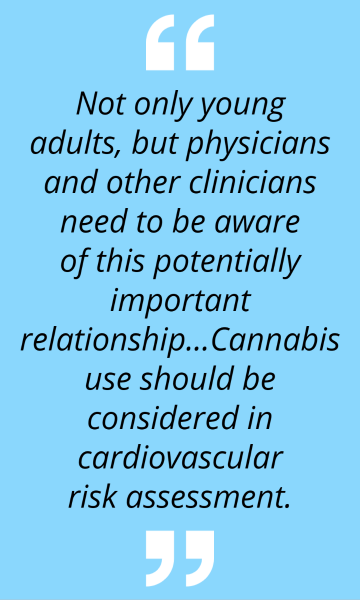- Clinical Technology
- Adult Immunization
- Hepatology
- Pediatric Immunization
- Screening
- Psychiatry
- Allergy
- Women's Health
- Cardiology
- Pediatrics
- Dermatology
- Endocrinology
- Pain Management
- Gastroenterology
- Infectious Disease
- Obesity Medicine
- Rheumatology
- Nephrology
- Neurology
- Pulmonology
Study: Younger Cannabis Users Nearly Twice as Likely to Report Heart Attack
©prima91/stock.adobe.com

Recent cannabis consumption was associated with increased odds of self-reported myocardial infarction (MI) in younger adults, according to a new study published in the Canadian Medical Association Journal.
“Although heavy cannabis use has been reported to trigger acute myocardial infarction, the current evidence is limited to case-control studies that are prone to bias and studies relying solely on administrative data,” wrote authors led by Karim Shiraz Ladha MD, MSc, clinician scientist at Unity Health Toronto. “It is also limited in its definition of exposure, as these studies assess patients with heavy cannabis use (cannabis abuse or cannabis use disorder).”

Ladha and colleagues analyzed data from 33 173 adults aged 18-45 years who participated in the 2017-2018 Behavioral Risk Factor Surveillance System (BRFSS) study conducted by the CDC, as “it is the best available source for providing insights which are generalizable and nationally representative," explained co-author Nikhil Mistry, PhD candidate, University of Toronto, in a press release.
Overall, 17.5% of participants reported recent cannabis use (defined for the purpose of the study as using cannabis at least once during the past 30 days), of whom nearly 71% reported frequent use (more than 4 times during the past 30 days).
Compared with nonusers, the prevalence of recent cannabis use was higher among men (62.9% vs 49.3%), unmarried respondents (68% vs 46.4%), current combustible cigarette users (31.6% vs 13.2%), current e-cigarette users (18.1% vs 5.1%), and heavy alcohol drinkers (17.4% vs 5.2%), according to the study.
A history of MI was more frequent among recent cannabis users than nonusers (1.3% vs 0.8%; adjusted odds ratio [aOR]=2.07; 95% CI, 1.12-3.82). Participants who reported frequent use were also more likely to have a history of MI (aOR=2.31; 95% CI, 1.18-4.5), as were those whose primary method of cannabis consumption was smoking (aOR=2.01; 95% CI, 1.02-3.98).
The link between cannabis consumption and MI remained significant when the data were adjusted for hypertension and hypercholesterolemia (aOR=3.54; 95% CI, 1.13-11.05), but not for negative control outcomes of skin cancer (aOR=1.02; 95% CI, 0.59-1.75) and blindness (aOR=0.98; 95% CI, 0.71-1.35), suggesting “limited residual confounding in our model,” wrote researchers.
"Not only young adults, but physicians and other clinicians need to be aware of this potentially important relationship,” stated co-author David Mazer, MD, clinician scientist, Unity Health Toronto, in the press release. “Cannabis use should be considered in cardiovascular risk assessment. When making decisions about cannabis consumption, patients and physicians should consider its associated benefits and risks, in the context of their own health risk factors and behaviours."
“Further studies and more data are needed to confirm these findings and elucidate the mechanisms contributing to cannabis-associated cardiovascular outcomes,” concluded researchers.
Reference: Ladha KS, Mistry N, Wijeysundera DN, et al. Recent cannabis use and myocardial infarction in young adults: a cross-sectional study. CMAJ. 2021;193:E1377-E1384.
